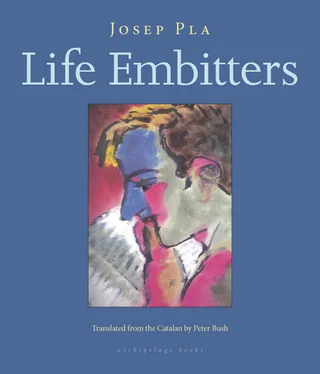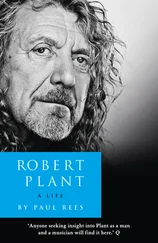Josep Pla - Life Embitters
Здесь есть возможность читать онлайн «Josep Pla - Life Embitters» весь текст электронной книги совершенно бесплатно (целиком полную версию без сокращений). В некоторых случаях можно слушать аудио, скачать через торрент в формате fb2 и присутствует краткое содержание. Год выпуска: 2015, Издательство: Archipelago, Жанр: Современная проза, на английском языке. Описание произведения, (предисловие) а так же отзывы посетителей доступны на портале библиотеки ЛибКат.
- Название:Life Embitters
- Автор:
- Издательство:Archipelago
- Жанр:
- Год:2015
- ISBN:нет данных
- Рейтинг книги:4 / 5. Голосов: 1
-
Избранное:Добавить в избранное
- Отзывы:
-
Ваша оценка:
- 80
- 1
- 2
- 3
- 4
- 5
Life Embitters: краткое содержание, описание и аннотация
Предлагаем к чтению аннотацию, описание, краткое содержание или предисловие (зависит от того, что написал сам автор книги «Life Embitters»). Если вы не нашли необходимую информацию о книге — напишите в комментариях, мы постараемся отыскать её.
Life Embitters — читать онлайн бесплатно полную книгу (весь текст) целиком
Ниже представлен текст книги, разбитый по страницам. Система сохранения места последней прочитанной страницы, позволяет с удобством читать онлайн бесплатно книгу «Life Embitters», без необходимости каждый раз заново искать на чём Вы остановились. Поставьте закладку, и сможете в любой момент перейти на страницу, на которой закончили чтение.
Интервал:
Закладка:
When they reached the village and the place they called the Cross Roads, the gardener’s son asked his father which way they should go to reach Sr Peret’s home.
“Do you want to go by the top road or the bottom?” he asked.
The gardener looked at a loss for a moment. In the meanwhile, something extraordinary happened. Sr Peret pushed away the blanket from his face and said in a perfectly normal tone of voice, “Take the top road. That’s the way I always go.”
The gardener and his son looked at each other completely taken aback. It seemed for a second that his response had annoyed them. As a matter of fact, everyone walking back from the vineyard was certain Sr Peret was dead or as good as. His sisters-in-law were crying. The neighbors walked along, pale-faced, heads on chests. Reacting to the words they’d just heard, gardener and son were almost on the point of bursting into hoots of laughter.
They went on walking and when they reached Sr Peret’s front door, the people huddled sorrowfully around the ominous stretcher. As they might have to carry Sr Peret up to his bed in their arms, the gardener thought it best to see how he was. He removed the blanket from his face, an act that sent a tremor of curiosity through those present. Sr Peret lay there, eyes shut, pale and still, as if asleep. The gardener went over and asked: “Well, Sr Peret, what’s the state of play? Are you alive or dead?”
“Far be it from me …” piped up Sr Peret faintly.
Given his reply, they had no choice but to carry him up to his bed — an action carried out with great expenditure of effort by the gardener, his son, and another person present at the scene.
All in all, his reply came as a great relief to all and sundry.
A Boarding House, Central Barcelona
I have always thought that the problems of inheritance — especially the financial sort — are extremely important and one of the most reliable and decisive paths to an understanding of the lives and characters of others.
The behavior of my friend Veciana, for example, immediately became crystal-clear when one learned that his father, who inherited a considerable fortune, bankrupted himself playing cards. Sr Veciana senior’s manic obsession with gambling meant he lived his final years in a quite disastrous, regrettable manner. He spent them — and he lived into his seventies — begging food from his friends and bothering charitable institutions, and then died in the workhouse.
His only son — the Veciana I knew — would have met a similar end, if his youthful carry-on was any indication, had it not been for his father’s catastrophe. That saved him, and saved him just in time. He abandoned his university studies because his father, dazzled by illusions of grandeur like so manic gamblers, wanted him to become a lawyer — a profession Veciana junior felt no affinity towards — and went to work as a debt-collector for a commercial enterprise, and a few years later for a bank. Veciana junior subsequently developed into a debt-collector who was noteworthy, discrete, conscientious, and completely honest. He scaled prestigious heights in his profession, to the extent that he invented the idea of the gradual redemption of the figure of the debt collector, an idea he often explained to me when we drank coffee together in the Tupinamba, and that consisted, if I understood him correctly, in a system that would eliminate the debt-collector by raising his status.
But inheritance isn’t the answer to everything, and I never did fathom the source of the close bonds that existed between my friend Veciana and Sr Pastells, the son of the renowned nineteenth-century Barcelona croupier Don Tomás Pastells, the great Pastells who had operated in aristocratic circles. His son also followed this trade for many years, though he never succeeded in emulating his father’s style and distinction. In the years I’m referring to, Sr Pastells had retired from gambling, was gradually eating into his capital, and led what he called a Cuban life: he went for a stroll, went to the movies, and read the daily papers.
One would more easily have understood — if understanding ever entered into it — his close friendship with Niubó the lawyer and registrar, because both were very knowledgeable. The registrar was tall, thin, and sallow, dressed in black and, though he had retired from the High Court a good five years ago, he still reeked, no doubt reluctantly, of wax-sealed paper and cigar butts. A recalcitrant bachelor who professed little interest in real life, he had apparently reached an age when it was time to become more human and open to the frailties of others. In fact, Sr Niubó and Sr Pastells were irreconcilable, because if Sr Pastells represented for the registrar the world of necessary evil and toleration, in the eyes of the croupier, Sr Niubó was born to embody unto death the majestic rule of law that, as everyone knows, is inexorable. The debt collector provided the terrain for dialogue between the two men. They both admired my friend Veciana and experienced in his presence the ancient, hallowed terror that parasites feel when confronted by people who work. That drew their two characters together, because, though in public they detested manual work, they were secretly aware they couldn’t have lived the life of Riley, that their lives would have been completely different, but for the existence of a few million Vecianes.
I admired him too, even though the figure of the humble debt-collector is always linked in my memory with the odor of velvet cloth I’ve never been able to smell without feeling an unpleasant queasiness in my stomach. At the time bank debt collectors wore velvet suits in summer and winter. It was a kind of uniform that characterized them. It was a smell that transported me deep into the struggles in our society, into the dark, dismal centuries that have been our downfall. Veciana said it was an honest smell, and in fact he wore velvet with the traditional, conscientious, respectable pride of the worker who was no shrinking violet.
The smell of a poor man’s velvet has always inspired fear in me; one day when we spoke of the perils this odor entails, he told me what happened the first time he donned his suit.
“I still remember,” Veciana said, “how the noise of the pants chafing on my legs tickled my ears as if they were being stroked with an ear of corn. I was a young lad and it rained that whole afternoon. I couldn’t budge from the apartment. I lived with my parents in old Barcelona. It was a small, dingy place that absorbed all the noises and smells from the inside courtyard. It was oppressive, sticky, and autumnal, and all around it reeked of that stench of yellow bile Barcelona gives off with the first heavy downpours. I wept the whole morning because the rain stopped me from showing off my suit. After lunch I felt my head was in a spin. I opened the window hoping for a breath of fresh air. That made it worse: a stink of fresh almonds and decomposing maggots to bring on a bad turn. I collapsed on the spot and they summoned the family doctor. It was Dr. Benet Cufí, who lived at the time on Carrer del Bisbe. Dr. Cufí quizzed my family.
My mother, who was very poor and deeply affected by my father’s financial disasters, said, “The more velvet stinks, the poorer it makes you. I just wanted to confirm that.”
The doctor was a good man, pleasant, understanding, and quite relaxed. He practiced neighborhood medicine.
“It’s nothing to worry about,” said Dr. Cufí. “The velvet has gone to his head … Give him a peppermint and a glass of orange-blossom water.”
“In case you think my experience was worthless,” said my friend Veciana, “his prescription confirms that the dangers from velvet amount to next to nothing.”
Читать дальшеИнтервал:
Закладка:
Похожие книги на «Life Embitters»
Представляем Вашему вниманию похожие книги на «Life Embitters» списком для выбора. Мы отобрали схожую по названию и смыслу литературу в надежде предоставить читателям больше вариантов отыскать новые, интересные, ещё непрочитанные произведения.
Обсуждение, отзывы о книге «Life Embitters» и просто собственные мнения читателей. Оставьте ваши комментарии, напишите, что Вы думаете о произведении, его смысле или главных героях. Укажите что конкретно понравилось, а что нет, и почему Вы так считаете.












